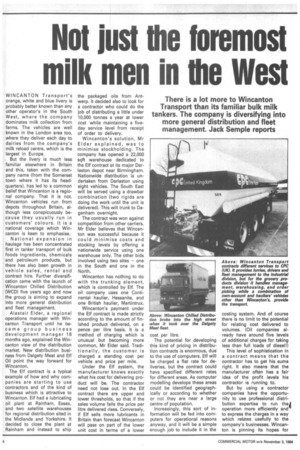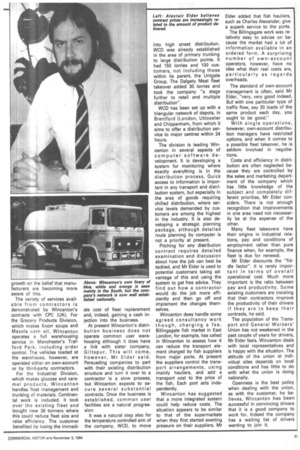Not just the foremost milk men in the West
Page 58

Page 59

If you've noticed an error in this article please click here to report it so we can fix it.
WINCANTON Transport's orange, white and blue livery is probably better known than any other operator's in the South West, where the company dominates milk collection from farms. The vehicles are well known in the London area too, where they deliver each day to dairies from the company's milk reload centre, which is the largest in Europe.
But the livery is much less familiar elsewhere in Britain and this, taken with the company name (from the Somerset town where it has its headquarters), has led to a common belief that Wincanton is a regional company. That it is not. Wincanton vehicles run from depots throughout Britain, although less conspicuously because they usually run in customers' colours. It is a national coverage which Wincanton is keen to emphasise.
National expansion in haulage has been concentrated first in tanker transport of bulk foods ingredients, chemicals and petroleum products, but there has also been growth in vehicle sales, rental and contract hire. Further diversification came with the launch of Wincanton Chilled Distribution (WCD) five years ago and now the group is aiming to expand into more general distribution and fleet management.
Alastair Elder, a regional operations manager with Wincanton Transport until he became group business development manager 18 months ago, explained the Wincanton view of the distribution market. New distribution business from Dalgety Meat and Elf Oil point the way forward for Wincanton.
The Elf contract is a typical example of how and why companies are starting to use contractors and of the kind of business which is attractive to Wincanton. Elf had a lubricating oil plant at Rainham, Essex, and two satellite warehouses for regional distribution sited in the Midlands and Yorkshire. It decided to close the plant at Rainham and instead to ship the packaged oils from Antwerp. It decided also to look for a contractor who could do the job of distributing a little under 10,000 tonnes a year at lower cost while maintaining a fiveday service level from receipt of order to delivery.
Wincanton's solution, Mr Elder explained, was to minimise stockholding. The company has opened a 22,000 sqft warehouse dedicated to the Elf contract at its major Darlaston depot near Birmingham. Nationwide distribution is undertaken from Darlaston using eight vehicles. The South East will be served using a drawbar combination (two rigids are doing the work until the unit is delivered). This will trunk to Dagenham overnight.
The contract was won against competition from other carriers. Mr Elder believes that Wincanton was successful because it could minimise costs and stocking levels by offering a nationwide service using one warehouse only. The other bids involved using two sites — one in the South and one in the North.
Wincanton has nothing to do with the trunking element, which is controlled by Elf. The oil company uses one Continental haulier, Hessanite, and one British haulier, Martintrux.
Wincanton's payment under the Elf contract is made strictly according to the amount of finished product delivered, on a pence per litre basis. It is a method of charging which is unusual but becoming more common, Mr Elder said. Traditionally, the customer is charged a standing cost per vehicle and price per mile.
Under the Elf system, the manufacturer knows exactly what his cost for delivering product will be. The contractor need not lose out. In the Elf contract there are upper and lower thresholds, so that if the sales volume falls the price per litre delivered rises. Conversely, if Elf sells more lubricants in Britain than forecast Wincanton will pass on part of the lower unit cost in terms of a lower cost per litre.
The potential for developing this kind of pricing in distribution contracts is enormous, due to the use of computers. Elf will be charged a flat rate for deliveries, but the contract could have specified different rates for different areas. As computer modelling develops these areas could be identified geographically or according to whether or not they are near a large centre of population.
Increasingly, this sort of information will be fed into com puters for operational reasons anyway, and it will be a simple enough job to include it in the costing system. And of course there is no limit to the potential for relating cost delivered to volumes. (Oil companies already have around five levels of additional charges for taking less than full loads of diesel!) This level of sophistication in a contract means that the contractor has to get his sums right. It also means that the manufacturer often has a fair idea of the profit levels his contractor is running to.
But by using a contractor companies have the opportunity to use professional distri bution expertise to run the1 operation more efficiently and to express the charges in a way which relates usefully to the company's businesses. Wincanton is pinning its hopes for growth on the belief that manufacturers are becoming more aware of this.
The variety of services available from contractors is demonstrated by Wincanton's contracts with CPC (UK). For the Grocery Products Division, which makes Knorr soups and Mazola corn oil, Wincanton operates a full warehousing service in Manchester's Trafford Park, including order control. The vehicles loaded at the warehouse, however, are operated either on own-account or by third-party contractors.
For the Industrial Division, which makes glucose and caramel products, Wincanton handles fleetmanagement and trunking of materials. Continental work is included. It took over the existing fleet and bought new 38 tonners where this could reduce fleet size and raise efficiency. The customer benefited by losing the immedi ate cost of fleet replacement and, indeed, gaining a cash injection into the business.
At present Wincanton's distribution business does not operate common user warehousing although it does have a link with sister company, Giltspur. This will come, however, Mr Elder said. Persuading companies to part with their existing distribution structure and turn it over to a contractor is a slow process, but Wincanton expects to secure several substantial contracts. Once the business is established, common user facilities are a natural progression.
It was a natural step also for the temperature controlled arm of the company, WCD, to move into high street distribution. WCD was already established in the area of primary trunking to large distribution points. It had 150 lorries and 100 customers, not including those within its parent, the Unigate Group. The Dalgety Meat fleet takeover added 30 lorries and took the company "a stage further to retail and multiple distribution".
WCD has been set up with a triangular network of depots, in Brentford (London, Uttoxeter and Chippenham, from which it aims to offer a distribution service to major centres within 24 hours.
The division is leading Wincanton in several aspects of computer software development. It is developing a system for monitoring where exactly everything is in the distribution process. Quick access to information is important in any transport and distribution system, but especially in the area of goods requiring chilled distribution, where service levels demanded by customers are among the highest in the industry. It is also developing a strategic planning package, although detailed route planning by computer is not a priority at present.
Pitching for any distribution contract requires detailed examination and discussion about how the job can best be tackled, and Mr Elder is used to potential customers taking advantage of this and using the system to get free advice. They find out how a contractor would do the job more efficiently and then go off and implement the changes themselves.
Wincanton does handle some agreed consultancy work though, charging a fee. Billingsgate fish market in East London, for example, has called in Wincanton to assess how it can reduce the transport element charged by fish suppliers from major ports. At present the suppliers control the transport arrangements, using mainly hauliers, and add a transport cost to the price of the fish. Each port acts independently.
Wincanton has suggested that a more integrated system could help reduce costs. The situation appears to be similar to that of the supermarkets when they first started exerting pressure on their suppliers. Mr Elder added that fish hauliers, such as Charles Alexander, give a superb service to the ports.
The Billingsgate work was relatively easy to advise on because the market had a lot of information available in an ordered form. A surprising number of own-account operators, however, have no idea what their real costs are, particularly as regards overheads.
The standard of own-account management is often, said Mr Elder, "very, very good indeed. But' with one particular type of traffic flow, say 20 loads of the same product each day, you ought to be good."
With single operations, however, own-account distribution managers have restricted options, and when it comes to a possible fleet takeover, he is seldom involved in negotiations.
Costs and efficiency in distribution are often neglected because they are controlled by the sales and marketing department of the company which has little knowledge of the subject and completely different priorities, Mr Elder considers. There is not enough recognition that improvements in one area need not necessarily be at the expense of the other.
Many fleet takeovers have their origins in industrial relations, pay and conditions of employment rather than pure finance when, for example, the fleet is due for renewal.
Mr Elder discounts the "fiddle factor". It is rarely important in terms of overall operational cost. Much more important is the ratio between pay and productivity. Some existing customers are insisting that their contractors improve the productivity of their drivers if they are to keep their contracts, he said.
The population of the Transport and General Workers' Union has not weakened in the past couple of years for drivers, Mr Elder feels. Wincanton deals with local representatives and is happy with the situation. The attitude of the union at individual sites depends on local conditions and has little to do with what the union is doing nationally.
Openness is the best policy when dealing with the union, as with the customer, he believes, Wincanton has been successful in convincing drivers that it is a good company to work for. Indeed the company has a waiting list of drivers wanting to join it.








































































































